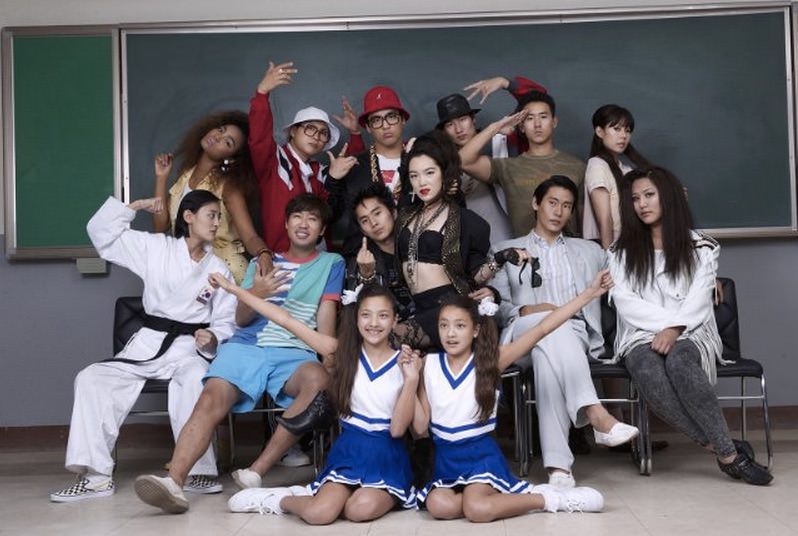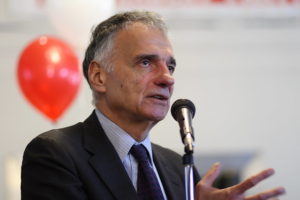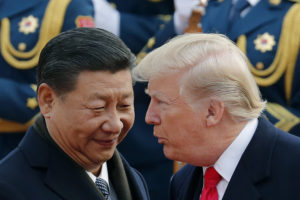Finally, a Teen Comedy About Asian Kids With an Asian Cast
Director Benson Lee, a Korean-American, was inspired by the ’80s teen angst movies of the late John Hughes. But you won’t find any of the stereotypical Asian characters that tended to turn up in Hughes’ movies -- that is, when Asians appeared at all. The cast of Benson Lee's "Seoul Searching." (IMDb)
The cast of Benson Lee's "Seoul Searching." (IMDb)
As a boy growing up in Philadelphia, director Benson Lee loved John Hughes’ coming-of-age comedies. In Lee’s latest feature, “Seoul Searching,” he pays tribute to the iconic ’80s filmmaker but with a much-needed reboot: He leaves out the stereotypical Asian characters that tended to turn up in Hughes’ movies — that is, when Asians appeared at all.
Instead, Lee has made a teen comedy in Hughes’ style but with a cast that almost without exception is of Asian origin, at least in part. Casting was part of the reason the film took more than 15 years to make.
Lee’s previous movies include the feature “Miss Monday” and the documentary “Planet B-Boy,” but “Seoul Searching,” which premiered at the Sundance Film Festival and hits theaters this summer, is a very personal project. In addition to Hughes’ influence, the inspiration for his new film came out of Lee’s experiences at a camp in Seoul he visited as a teenager — against his wishes — to learn about his Korean heritage. It ended up being one of the best experiences of his life.
Lee screened “Seoul Searching” in March at the opening of the Center for Asian American Media’s film festival (CAAMfest) in San Francisco, where he told the audience he was “hella excited to be in the Bay.” The feeling was mutual, apparently: “Seoul Searching” won the audience award at CAAMfest.
During his press tour for the festival, Lee sat down with Truthdig to talk about the Korean diaspora, stereotypes of Asians in the media and turning to Facebook to find actors for the film.
You start the movie with clips of people leaving Korea after the Korean War. How aware were you of the Korean diaspora as a kid?
At the time, I deduced that people had gone around the world, and as I got older, I met people from other parts of the world, and I learned that there was a lot of similar reasons, and it informed me as to why the camp was created. I remember my father told me about the camp; he said, “They created this for you and kids like you because you have no source for understanding your motherland, your Korean culture.” So this is a way to connect with that — which is why they sent us there.
You said they stopped doing the camp after a few years.
There was just too much liability, because all the kids [are] under 18. They thought the kids would be a lot more obedient — they had no idea how insane American kids are, especially.
You talk about how you love John Hughes. Did he really influence this movie?
Absolutely. I really enjoyed John Hughes’ movies. They played a much more important role back then than teen comedies now because we were less connected. I heard someone say recently, “Could you imagine a world without smartphones?” I was like, “Yeah, when we were growing up we didn’t have them.” As a result, we were definitely less connected. We didn’t really know what was going on in other places except through music and TV shows like “American Bandstand” and “Soul Train.” So they were a gauge as to what was going on.
The success of “The Breakfast Club” is it really captured the zeitgeist of teens and what they were going through. Pop culture exploded in the ’80s because of MTV and cable. This year they’re re-releasing “Breakfast Club” in theaters. There’s a reason for that. I think it represents an era that was a lot simpler. We were a lot more sheltered, and as a result, a lot less informed. The information superhighway was cable TV back then. Now everyone is connected. You know exactly what’s going on the minute it happens, and there’s good and bad to that. For me, it was about recapturing that era — it wasn’t always politically correct, but as result it was a lot wilder.
So yeah, Hughes was a very important filmmaker to me when I was growing up. Teen comedies have a certain formula, like horror, but it can be made well. I appreciate really well-made horror movies, like James Wan’s “The Conjuring,” where there’s more depth and story. That’s what I liked about John Hughes movies, is that he showed the vulnerability of the teens and focused on issues very relevant for kids at the time. That’s what I wanted to do.
But at the same time I didn’t like the portrayal of Asians in his movies. Like Long Duk Dong in [“Sixteen Candles”], and “Revenge of the Nerds” had that kind of nerdy Japanese guy. They were always the nerds, so we had no one to really identify with, and that’s a very important thing for young kids when they see other people like them in the media. At that time the only things we had were old Korean War dramas, told from an American perspective, on PBS or “M*A*S*H” on TV. We were always like, “Oh, there’s a Korean.” So we didn’t have much to identify with; we didn’t have role models on TV. That was important for me in making this movie, that maybe young people can have role models through a movie like mine.
Have you ever seen “The Slanted Screen,” about Asian men in the media, by San Francisco’s public defender, Jeff Adachi?
Phenomenal documentary.
How do you feel that things have changed with the portrayal of Asians in the media?
There’s a huge shift now because there’s so much emphasis on diversity. Now we’re all about individual rights — that African-American male who dies is no longer a nameless, faceless kid to us, and we are more sensitive about our portrayals now. I think the level of consciousness in terms of people’s rights, and representation is so much higher than ever before. Shows like “Fresh Off the Boat” and “Empire,” which were really risky, are the No. 1 shows right now.
This movie took about 16 years to make — why did it take that long?
I wanted to make a movie about a bunch of Asian kids, a teen comedy, but also a drama, set in Korea in 1986. Some people couldn’t wrap their heads around that. The way people look at ethnicity in [the movie business] is the key demographics of each group. The biggest moviegoing audience in the United States is the white audience. Second-biggest is Latino. Third is African-American. Four is Asian, but we only constitute about 6 percent of the box office. So they say, “Well, it will probably do well with that audience, but it probably won’t cross over.” So there are reasons that make people make certain business decisions.
What made you stay with it?
It was a dream for me as a filmmaker making a very personal movie — it’s like any other ambition that you really want to do in your life. It was something really important to me. You realize you have one life, and there are some things you really, really want to do, and this, to me, was one of them.
What do you think is universal about it?
Most people remember or are currently going through the pains of being a teenager. It’s a scary time and it’s a dramatic time and an idealistic time, but it’s beautiful even with all its acne and confusion. You start to think more about your future and realize what’s really important to you, so people can relate to those themes, coming-of-age themes. You found some of your cast on Facebook. How did that work and why did you do it that way?
I’ve worked on studio movies where I’ve had huge casting budgets, but on indies, you don’t have those options. Casting an Asian film with a large ensemble cast is not easy. There’s not a lot of Asian actors out there, to be honest, because there aren’t a lot of roles for them, although that’s changing. I’m open to working with non-actors because I love training actors, so I thought let’s go on Facebook. So we held an online casting call where we put out the word we were looking for these types of characters and we gave the synopsis of the movie and a summary of the character and a monologue. They’d film themselves, upload it to YouTube and post it on our Facebook page. Then we invited the top ones to in-person auditions.
Who did you get that way?
The adoptee — she never acted a day in her life. Also Mike Song, who played the racist military guy. In real life, he’s like an angel. He’s the nicest guy in the world, and he was so disturbed to have to play that role.
You said at the opening that you wanted to have an adoptee character in the movie — how come?
International adoption was started in Korea because after the Korean War there were a lot of kids who were orphaned, so this agency decided, well, there’s a lot of parents who can’t have children, why don’t we pair them up with these orphans? So they started shipping these kids out of Korea at a profound rate. It became something of an industry in Korea, and these were the first kids raised outside their environment, and they struggled a lot with the theme of identity, which is a very important theme in “Seoul Searching,” and they’re part of our diaspora, and they need to be recognized.
Your support matters…Independent journalism is under threat and overshadowed by heavily funded mainstream media.
You can help level the playing field. Become a member.
Your tax-deductible contribution keeps us digging beneath the headlines to give you thought-provoking, investigative reporting and analysis that unearths what's really happening- without compromise.
Give today to support our courageous, independent journalists.






You need to be a supporter to comment.
There are currently no responses to this article.
Be the first to respond.